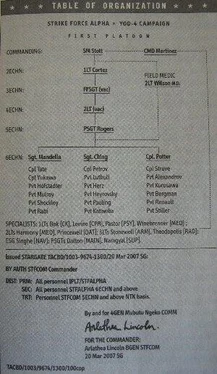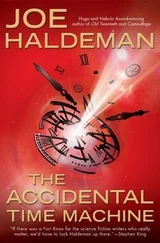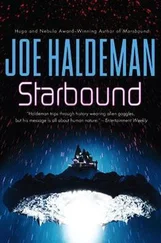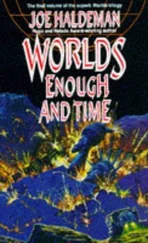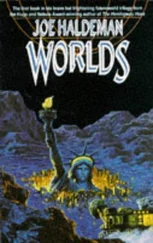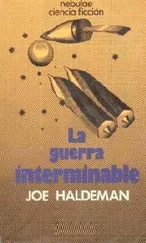With elaborate gestures, I managed to get everybody collected in the center of the field, under the fighter’s tail, where the weapons were racked.
There were plenty of weapons, since we had been prepared to outfit three times this number of people. After giving each person a shield and short-sword, I traced a question in the snow: GOOD ARCHERS? RAISE HANDS. I got five volunteers, then picked out three more so that all the bows would be in use. Twenty arrows per bow. They were the most effective long-range weapons we had; the arrows were almost invisible in their slow flight, heavily weighted and tipped with a deadly sliver of diamond-hard crystal.
I arranged the archers in a circle around the fighter (its landing fins would give them partial protection from missiles coming in from behind) and between each pair of archers put four other people: two spear-throwers, one quarterstaff, and a person armed with battle-ax and a dozen throwing knives. This arrangement would theoretically take care of the enemy at any range, from the edge of the field to hand-to-hand combat.
Actually, at some 600-to-42 odds, they could probably walk in with a rock in each hand, no shields or special weapons, and still beat the shit out of us.
Assuming they knew what the stasis field was. Their technology seemed up to date in all other respects.
For several hours nothing happened. We got about as bored as anyone could, waiting to die. No one to talk to, nothing to see but the unchanging gray dome, gray snow, gray spaceship and a few identically gray soldiers. Nothing to hear, taste or smell but yourself.
Those of us who still had any interest in the battle were keeping watch on the bottom edge of the dome, waiting for the first Taurans to come through. So it took us a second to realize what was going on when the attack did start. It came from above, a cloud of catapulted darts swarming in through the dome some thirty meters above the ground, headed straight for the center of the hemisphere.
The shields were big enough that you could hide most of your body behind them by crouching slightly; the people who saw the darts coming could protect themselves easily. The ones who had their backs to the action, or were just asleep at the switch, had to rely on dumb luck for survival; there was no way to shout a warning and it took only three seconds for a missile to get from the edge of the dome to its center.
We were lucky, losing only five. One of them was an archer, Shubik. I took over her bow and we waited, expecting a ground attack immediately.
It didn’t come. After a half-hour, I went around the circle and explained with gestures that the first thing you were supposed to do, if anything happened, was to touch the person on your right. He’d do the same, and so on down the line.
That might have saved my life. The second dart attack, a couple of hours later, came from behind me. I felt the nudge, slapped the person on my right, turned around and saw the cloud descending. I got the shield over my head, and they hit a split-second later.
I set down my bow to pluck three darts from the shield and the ground attack started.
It was a weird, impressive sight. Some three hundred of them stepped into the field simultaneously, almost shoulder-to-shoulder around the perimeter of the dome. They advanced in step, each one holding a round shield barely large enough to hide his massive chest. They were throwing darts similar to the ones we had been barraged with.
I set up the shield in front of me — it had little extensions on the bottom to keep it upright — and with the first arrow I shot, I knew we had a chance. It struck one of them in the center of his shield, went straight through and penetrated his suit.
It was a one-sided massacre. The darts weren’t very effective without the element of surprise — but when one came sailing over my head from behind, it did give me a crawly feeling between the shoulder blades.
With twenty arrows I got twenty Taurans. They closed ranks every time one dropped; you didn’t even have to aim. After running out of arrows, I tried throwing their darts back at them. But their light shields were quite adequate against the small missiles.
We’d killed more than half of them with arrows and spears, long before they got into range of the hand-to-hand weapons. I drew my sword and waited. They still outnumbered us by better than three to one.
When they got within ten meters, the people with the chakram throwing knives had their own field day. Although the spinning disc was easy enough to see and took more than a half-second to get from thrower to target, most of the Tauran’s reacted in the same ineffective way, raising up the shield to ward it off. The razor-sharp, tempered heavy blade cut through the light shield like a buzz-saw through cardboard.
The first hand-to-hand contact was with the quarterstaffs, which were metal rods two meters long that tapered at the ends to a double-edged, serrated knife blade. The Taurans had a cold-blooded — or valiant, if your mind works that way — method for dealing with them. They would simply grab the blade and die. While the human was trying to extricate his weapon from the frozen death-grip, a Tauran swordsman, with a scimitar over a meter long, would step in and kill him.
Besides the swords, they had a bolo-like thing that was a length of elastic cord that ended with about ten centimeters of something like barbed wire, and a small weight to propel it. It was a dangerous weapon for all concerned; if they missed their target it would come snapping back unpredictably. But they hit their target pretty often, going under the shields and wrapping the thorny wire around ankles.
I stood back-to-back with Private Erikson, and with our swords we managed to stay alive for the next few minutes. When the Taurans were down to a couple of dozen survivors, they just turned around and started marching out. We threw some darts after them, getting three, but we didn’t want to chase after them. They might turn around and start hacking again.
There were only twenty-eight of us left standing. Nearly ten times that number of dead Taurans littered the ground, but there was no satisfaction in it.
They could do the whole thing over, with a fresh 300. And this time it would work.
We moved from body to body, pulling out arrows and spears, then took up places around the fighter again. Nobody bothered to retrieve the quarterstaffs. I counted noses: Charlie and Diana were still alive (Hilleboe had been one of the quarterstaff victims), as well as two supporting officers. Wilber and Szydlowska. Rudkoski was still alive but Orban had taken a dart.
After a day of waiting, it looked as though the enemy had decided on a war of attrition rather than repeating the ground attack. Darts came in constantly, not in swarms anymore, but in twos and threes and tens. And from all different angles. We couldn’t stay alert forever; they’d get somebody every three or four hours.
We took turns sleeping, two at a time, on top of the stasis field generator. Sitting directly under the bulk of the fighter, it was the safest place in the dome.
Every now and then, a Tauran would appear at the edge of the field, evidently to see whether any of us were left. Sometimes we’d shoot an arrow at him, for practice.
The darts stopped falling after a couple of days. I supposed it was possible that they’d simply run out of them. Or maybe they’d decided to stop when we were down to twenty survivors.
There was a more likely possibility. I took one of the quarterstaffs down to the edge of the field and poked it through a centimeter or so. When I drew it back, the point was melted off. When I showed it to Charlie, he rocked back and forth (the only way you can nod in a suit); this sort of thing had happened before, one of the first times the stasis field hadn’t worked. They simply saturated it with laser fire and waited for us to go stir-crazy and turn off the generator. They were probably sitting in their ships playing the Tauran equivalent of pinochle.
Читать дальше
